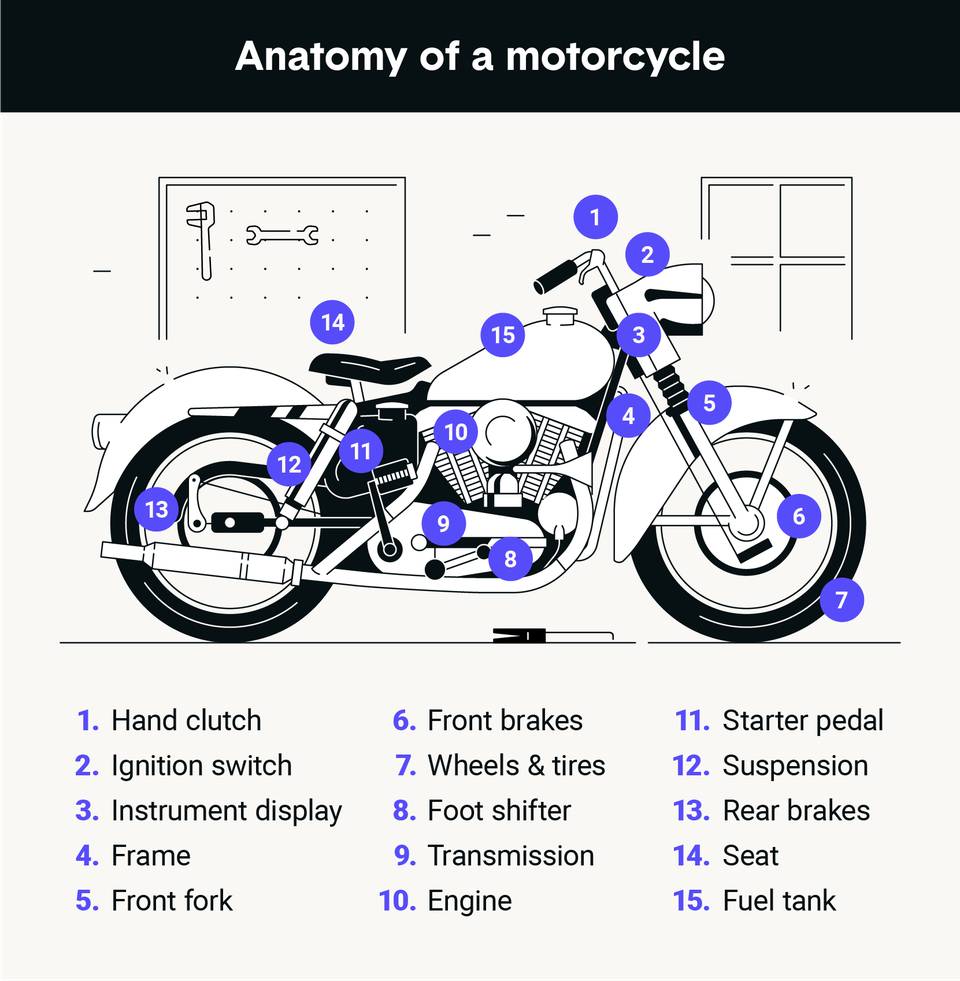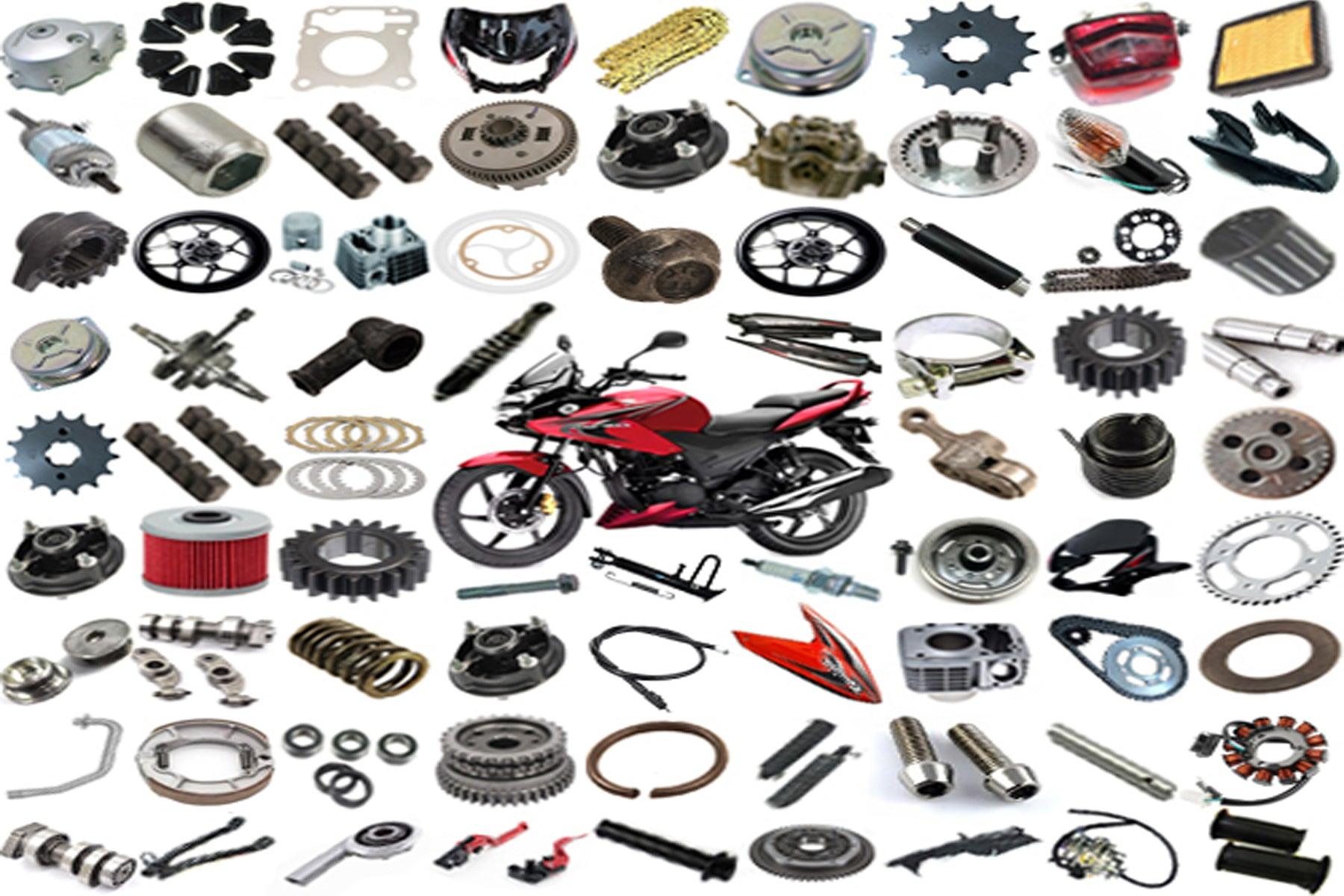What Every Rider Should Know About Choosing Quality Motorcycle Parts Auckland
What Every Rider Should Know About Choosing Quality Motorcycle Parts Auckland
Blog Article
Discover the Essential Motorcycle Components You Required for Ideal Performance
Comprehending the crucial parts of a motorcycle is basic for accomplishing peak performance. Each element, from the engine to the braking system, plays an essential function in total functionality and security. Normal maintenance can avoid unforeseen failings and boost the riding experience. However, many cyclists forget the details of these systems. Uncovering how they collaborate can lead to an extra effective adventure. What critical components should every biker prioritize?
The Engine: The Heart of Your Motorbike
The engine serves as the core component of a bike, driving its efficiency and defining its capacities. It is accountable for converting gas into mechanical energy, which powers the bike onward. Various kinds of engines are utilized, consisting of single-cylinder, V-twin, and inline arrangements, each offering unique qualities matched for various riding designs and purposes. The engine size, typically determined in cubic centimeters (cc), substantially influences performance, with larger engines usually supplying more power and torque.Furthermore, the engine's style and modern technology, such as gas shot systems or air-cooling versus liquid-cooling, influence effectiveness and integrity. Upkeep is vital for peak procedure; aspects like regular oil modifications and monitoring stimulate plugs assurance durability. Riders often take into consideration an engine's responsiveness and level of smoothness, as these qualities boost the general riding experience. Eventually, the engine remains a vital component that specifies not just the bike's performance but additionally the biker's link to the machine.
The Transmission: Changing Gears Smoothly
The transmission plays an important role in a motorcycle's performance, specifically in the auto mechanics of equipment shifting. Comprehending exactly how to move gears smoothly can improve the total riding experience, while normal upkeep assurances peak performance. Correct focus to these aspects can significantly influence the long life and effectiveness of the motorcycle.

Equipment Shifting Mechanics
Smooth equipment moving is vital for excellent motorcycle performance, substantially impacting both velocity and control. The auto mechanics of equipment moving include the interaction between the clutch, equipment lever, and transmission system. When a rider engages the clutch, it disengages the engine from the transmission, permitting a gear adjustment without harming the parts. A well-timed release of the clutch, combined with exact motion of the equipment lever, helps with a seamless adjustment in between gears. This procedure ensures that the engine operates within its finest power band, enhancing performance. Motorcycle Spares Christchurch. In addition, recognizing the equipment proportions and their effect on rate and torque can aid motorcyclists make educated options throughout changes, ultimately contributing to a more satisfying and responsive riding experience
Maintenance Tips Value
Routine maintenance plays a crucial role in ensuring that the transmission system operates effectively, enabling smooth gear shifts. Frequently changing the transmission and checking liquid is essential, as old fluid can lead to raised friction and wear. In addition, checking the clutch for wear assurances peak involvement and disengagement, avoiding slippage during equipment modifications. Lubrication of relocating components is similarly vital to decrease friction and boost performance. Motorcycle owners should also check for leaks and uncommon noises, as these can suggest underlying issues. By adhering to these maintenance suggestions, cyclists can prolong the life expectancy of their transmission system, assuring that equipment changes continue to be seamless and adding to the overall efficiency of their motorbike.
The Braking System: Ensuring Safety And Security on Every Adventure
Braking systems are essential components that directly influence a motorbike's safety and security and efficiency. They consist of various components, consisting of brake pads, blades, calipers, and hydraulic lines, all working together to ensure effective slowdown. The type of stopping system-- usually either disc or drum-- impacts responsiveness and stopping power.Regular maintenance is important to copyright peak performance; worn brake pads can lead to reduced performance and raised quiting ranges. Additionally, the quality of brake liquid must be kept an eye on, as it can take in wetness over time, compromising braking efficiency.Riders need to also think about the importance of anti-lock stopping systems (ABS), which stop wheel lockup during abrupt quits, enhancing overall safety and security. Appropriately operating brakes are not nearly stopping; they infuse confidence in the biker, permitting more secure navigating with different surfaces. Inevitably, a dependable braking system is vital for enjoying every ride with satisfaction.
The Suspension: Enhancing Convenience and Control
A well-functioning suspension system substantially adds to a motorbike's total performance, complementing the efficiency of the braking system. The suspension plays a substantial role in absorbing shocks from irregular surface areas, guaranteeing a smoother ride while preserving tire contact with the roadway. This get in touch with is essential for both stability and control, permitting cyclists to browse corners with confidence and precision.Different sorts of shock absorber, such as telescopic forks or mono-shocks, provide differing levels of comfort and handling. Appropriately tuned suspension enhances responsiveness, giving the cyclist with an extra connected feel to the motorcycle. Regular maintenance checks are very important to ascertain the suspension elements, consisting of springs and dampers, are functioning at their finest. A reliable shock absorber not only raises the riding experience however likewise contributes to the longevity of various other motorcycle parts by reducing wear and tear. Consequently, purchasing top quality suspension is important for any major motorbike enthusiast.
The Tires: Attaching You to the Roadway
Tires play a vital function in a motorcycle's efficiency, working as the key web link between the rider and the roadway. Recognizing the various kinds of tires readily available can greatly affect managing and safety and security. Furthermore, normal upkeep is essential to guarantee peak tire efficiency and durability.
Tire Types Explained
Exactly how do different tire kinds influence a motorcycle's efficiency? Tire types play an essential duty in determining a motorbike's handling, hold, and security. Sport tires, developed for high performance, deal improved grip and click now responsiveness on smooth roadways, making them optimal for competing and aggressive riding. On the other hand, touring tires focus on toughness and comfort, offering a smoother trip for long-distance traveling. Off-road tires, defined by their sturdy walk patterns, succeed in grip on unpaved surface areas, suitable for journey enthusiasts. Furthermore, dual-sport tires blend qualities from both on-road and off-road classifications, catering to functional riding needs. Ultimately, choosing the appropriate tire type is necessary for maximizing efficiency, ensuring security, and enhancing the overall riding experience.
Upkeep Tips Offered
While riding when traveling, keeping excellent tire condition is important for security and performance. Routinely checking tire pressure is necessary, as under-inflated tires can result in inadequate handling and enhanced wear. It is suggested to check step depth frequently; worn tires concession grasp and security. In addition, bikers should look for signs of damage, such as lumps or cracks, which can indicate the need for substitute. Rotating tires occasionally guarantees even use, improving longevity. Keeping tires clean from debris and staying clear of extreme curbs can prolong their lifespan. Maintaining proper positioning and equilibrium contributes to peak performance, minimizing stress and anxiety on various other bike elements. Sticking to these maintenance tips will substantially improve the overall riding experience.
The Gas System: Sustaining Performance and Effectiveness
The gas system plays a vital function in maximizing a motorcycle's performance and efficiency, as it assures the optimum distribution of gas to the engine. It comprises numerous vital elements, including the gas storage tank, fuel pump, fuel filter, and fuel injectors or carburetor. Each component should function efficiently to guarantee a smooth and powerful ride.The gas container stores gas and provides it to the engine via the fuel pump, which produces the essential stress. A gas filter prevents impurities from getting in the engine, while the injectors or carburetor mix gas with air for combustion.Proper upkeep of the gas system is critical; a blocked filter or malfunctioning injector can lead to reduced performance and increased fuel intake. By confirming that the fuel system operates effectively, bikers can enjoy better throttle reaction, far better fuel economy, and on the whole enhanced riding experience.
The Electric System: Powering Your Ride
An effective electric system is vital for the total functionality and safety and security of a motorbike, as it powers crucial parts such as the ignition, illumination, and numerous electronic systems. This system includes the battery, which stores energy, and the alternator, liable for generating power while the engine runs. The wiring harness connects these elements, making certain reputable power distribution.Additionally, integrates shield the system from overloads, while relays assist manage high-current gadgets with low-power signals. A properly maintained electric system improves performance by making certain smooth beginnings and constant operation of signals and lights, essential for cyclist exposure and safety.Regular checks of the battery's charge and connections are very important for avoiding electrical failures. Bikers should likewise check electrical wiring for deterioration, making sure all parts function preferably. Eventually, a durable electrical system adds substantially see page to the total performance and dependability of the motorcycle.
Frequently Asked Inquiries
Just how Often Should I Replace My Motorcycle's Battery?
The frequency of bike battery substitute depends on usage and maintenance (Motorcycle Parts Auckland). Typically, batteries must be changed every 3 to five years. Routine checks can aid determine when a substitute is essential for peak performance
What Devices Do I Need for Basic Motorbike Maintenance?
For basic motorcycle maintenance, one calls for necessary devices such as a socket collection, wrenches, screwdrivers, pliers, tire pressure gauge, and a torque wrench. These devices promote efficient maintenance and guarantee the motorbike runs successfully and safely.
Exactly How Can I Improve My Bike's The rules of aerodynamics?
To improve bike aerodynamics, one should consider readjusting fairings, utilizing windshield expansions, maximizing body setting, and minimizing general weight. These modifications help reduce drag, enhancing security and fuel effectiveness throughout trips.
What Are the Indicators of a Failing Electric System?
Indications of a stopping working electric system consist of dimming lights, problem starting, uneven instrument readings, and blown merges. Bike Parts Wellington. Unusual scents or rust around battery terminals may likewise suggest underlying issues needing prompt attention for safety and performance

How Do I Select the Right Oil for My Motorcycle?
When choosing oil for a bike, one should think about the manufacturer's specs, thickness ratings, and the type of riding. Furthermore, synthetic Your Domain Name versus conventional oil can influence efficiency and engine defense, influencing the choice considerably. The engine dimension, commonly gauged in cubic centimeters (cc), significantly affects efficiency, with bigger engines usually giving even more power and torque.Furthermore, the engine's style and modern technology, such as fuel shot systems or air-cooling versus liquid-cooling, affect effectiveness and integrity. A well-functioning suspension system considerably adds to a motorbike's total performance, matching the effectiveness of the stopping system. The fuel system plays an essential function in making the most of a motorcycle's performance and effectiveness, as it ensures the optimal distribution of fuel to the engine. A fuel filter stops pollutants from going into the engine, while the injectors or carburetor mix fuel with air for combustion.Proper maintenance of the fuel system is essential; a clogged up filter or malfunctioning injector can lead to lowered efficiency and raised fuel consumption. A properly maintained electric system enhances performance by making sure smooth starts and constant operation of lights and signals, important for biker presence and safety.Regular checks of the battery's cost and connections are important for protecting against electric failures.
Report this page